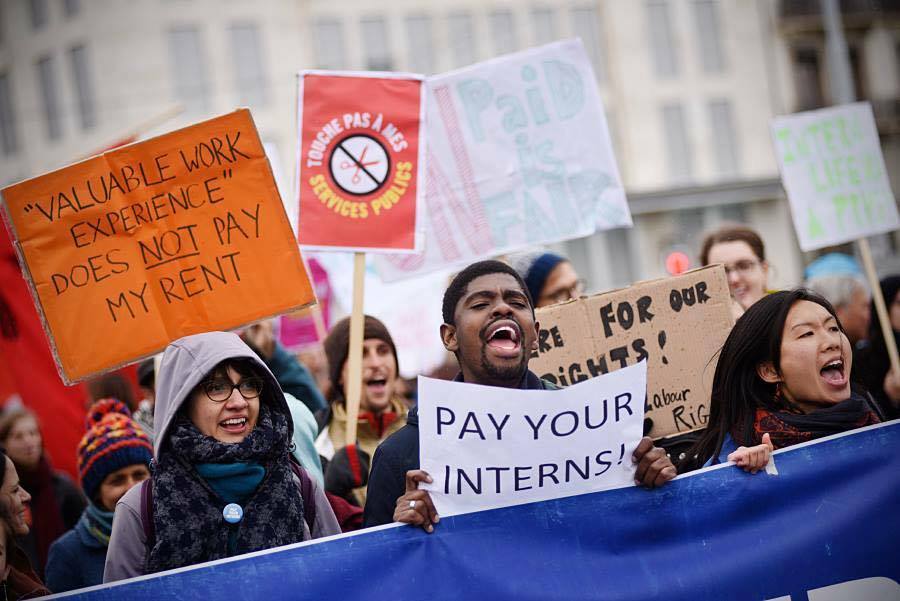As the United Nations turns 75 years old in October, it is time for all of us to reflect on what the UN has and has not achieved over all those years. For many young people, the lack of payment of interns within the UN Secretariat is one of the failures that the UN has not adequately addressed in the last 75 years.
At the Fair Internship Initiative (FII), we have been advocating since 2015 for equally accessible and quality internships across the UN system, which includes the payment of interns.
Back in 1958 UN Internship Programme provided stipends
Although the original UN Internship Program, dating back to 1958, provided stipends and travel allowances to a select number of young people, subsequent administrations chose to change the policy, with interns eventually being put into the category of Gratis Personnel “Type I”. Originally, this category was created for associate experts and other forms of seconded personnel, financed by their sponsoring governments. Nevertheless, with time interns ended up representing more than 85% of the “type I” gratis personnel. Whilst private companies and NGOs must adhere to national employment laws, the UN and other international organizations are exempt. This has left to organizations themselves to regulate how internships are governed. Contrary to popular belief, propagated by UN spokespersons themselves, there is no UN General Assembly resolution prohibiting the administration to provide financial assistance to interns. On the contrary, these matters are regulated by an internal administrative instruction (currently Administrative Instruction ST/AI/2020/1).
Unpaid internships have been the bane of any young professional’s aspirations to enter the workforce and, particularly the UN system. Not only is it discouraging to not have the work valued at all, the lack of payment also poses an entry barrier for many young people from developing countries and disadvantaged socioeconomic backgrounds that are qualified and wish to work for an organization, such as the UN. As a result, the biennial composition report on gratis personnel shows that close to 50% of all UN Secretariat interns come from only seven countries. Therefore, unpaid internships within the UN system lead to inequalities and work against the Sustainable Development Goals (SDGs) 8 and 10 on “Decent Work and Economic Growth” and “Reduced Inequalities” respectively.
Initiatives to advocate for a change
In 2015, the Quality and Fairly Remunerated Internships Initiative in New York and the Pay Your Interns Initiative in Geneva joined forces to address these inequalities resulting from unpaid internships. Both initiatives led intern protests at their duty stations and addressed then-Secretary-General Ban Ki Moon in a letter.
This led to the creation of FII, which still operates today as a network of current and former UN interns that advocates for equally accessible and quality internships across the UN system. So, while the UN celebrates its 75th anniversary this year, FII likewise looks back at five years of its advocacy.
While by 2009 only 5 UN entities were paying their interns, namely WFP, IAEA, ILO, UNWTO and UPU, by 2018, 12 UN entities had already established compensation schemes that allowed interns to receive a stipend from their hosting organizations. Since January 2020, WHO and UNDP have also begun providing their interns with stipends.
In this context, WHO could provide an example in how the UN Secretariat could eventually move to paying its interns. In fact, interns’ advocacy with the permanent missions led to the adoption of a resolution (A71/B/CONF./1), requesting the WHO in 2018 to provide financial support to all interns and increase diversity of interns’ population.
With the United Nations Strategy on Youth (Youth 2030), the UN expressed its willingness to support “minimum quality standards across the UN for internship programmes and advance efforts to ensure adequate compensation of interns and widening of the intern pool.” And with more and more UN funds and programmes and specialized agencies adopting compensation schemes for their interns, the Secretariat is increasingly put under pressure to act accordingly. Thus, paid internships in the UN Secretariat should become a matter of when, not if.
Unpaid internships are unfair
It is a fact that unpaid internships are unfair. They create and exacerbate inequalities, providing an entry barrier for many qualified young people from lower socio-economic backgrounds. While the UN frequently laments the slow progress towards the SDGs, it should turn to its internal structure first and ensure that young people are no longer discriminated against by unpaid internships. If the UN wants to deliver on the Decade of Action, paid internships in the Secretariat will be a key component. Maybe by 2045, when the UN celebrates its 100th anniversary, its internship programmes will become more diverse, inclusive, and fair.



